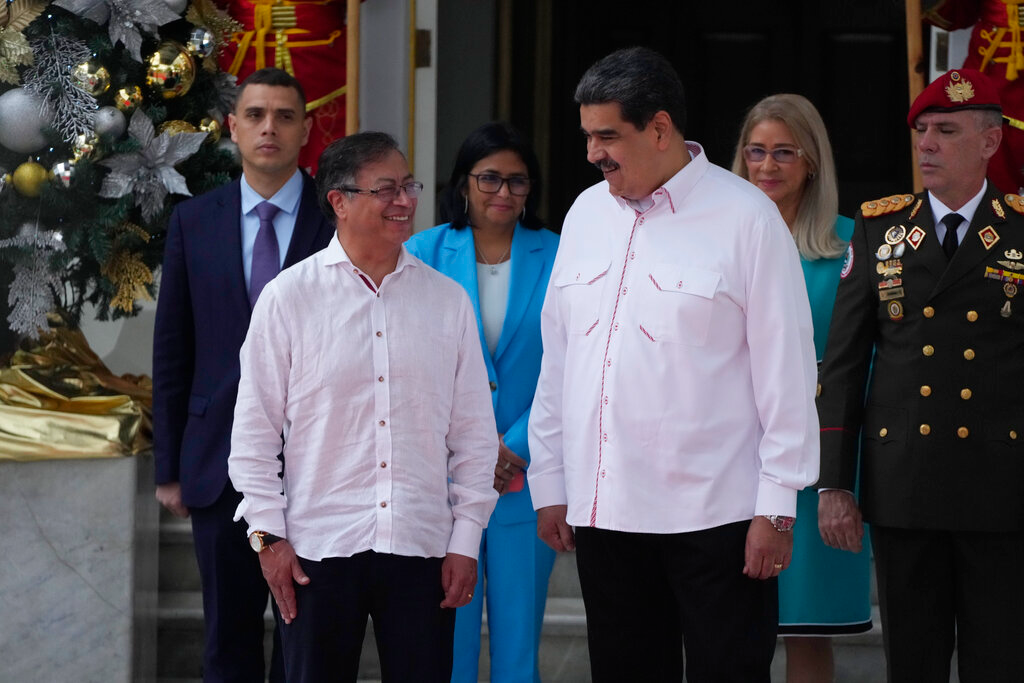Colombian and US Presidents Discuss Hemispheric Cooperation and Venezuelan Sanctions
Gustavo Petro, Colombia’s president, meets with President Biden at the White House. April 20, 2023. Image source: AP Photo
President Biden met Colombian President Gustavo Petro on Thursday, Apr. 20th, to discuss regional cooperation on climate change, migrations, and energy policy. This meeting covered sensitive and timely topics concerning: Venezuela, migration, and counter-drug trafficking measures.
The meeting comes after the US, Colombia, and Panama signed a new two-month cooperation agreement aimed to find pathways to limit access to a key route that allows migrants to travel from South America to the United States.
“We are going down the same river, a river that leads us to ever-greater democracy and ever-greater freedom,” Petro said. “We have a common agenda and a lot of work to do.”
This meeting signals a shift towards cooperation, given Petro’s recent comments to the UN earlier last week, where he criticized US-led efforts to prohibit cocaine production by saying that global powers prioritize the consumption of oil, which is more deadly than cocaine, Petro also emphasized how the US’s “war on drugs” failed and lead to worse outcomes in affected communities.
One product that Colombia’s economy produces is the coca leaf, one of the main ingredients used to produce cocaine, but also a medicinal and energizing herb used throughout the Andes as a nutritional and stimulating supplement. US officials have long advocated for the eradication of coca fields as a measure to counteract the influence of drug trafficking groups in the region. These measures have led to substantial backlash from Colombia, Ecuador, Peru, and Bolivia, countries that both economically and socially depend on the internal consumption of the coca leaf.
Despite these policy differences, Petro and Biden also discussed the current US sanctions on Venezuela.
Latin American diplomacy, recently, has been spearheaded both by Colombia and Brazil, seeking to become “international peace-brokers” says Richard Emblin, director of Colombia’s “The City Paper.” Colombia’s latest push for this role involves becoming Venezuela’s intermediary during this meeting.
Gustavo Petro meets with Venezuelan President Nicolas Maduro outside of the Miraflores Presidential Palace, in Caracas, Venezuela on Nov. 1, 2022. Photo: AP Photo/Ariana Cubillos
According to a senior administration official, Petro’s goal was to discuss the willingness of the US to ease sanctions on Venezuela. However, Biden reiterated his reluctance to provide sanctions relief without a credible commitment from Venezuelan President Nicolas Maduro to “take democratic steps with the country’s opposition.”
Understanding this, Petro is focused on helping Venezuela to be able to commit to more democratic measures, especially taking into consideration Biden’s recent approach to reducing pressure on the Venezuelan government.
Colombia, as part of these efforts, will be hosting an international conference on Venezuela next week. The event’s objective is to get closer to “more democracy, with zero sanctions.”
At the start of his term, Biden eased some sanctions on Maduro’s government, a measure opposed to Trump’s “maximum pressure” campaign, as a mechanism to encourage dialogue between US and Venezuela. As of now, however, negotiations have stalled.
Prior to Petro’s reception at the White House, Republican lawmakers in Congress began to sound the alarms, calling Petro an “agent of chaos.” More specifically, Senator Marco Rubio (R-FL), has accused Petro of wanting to court Venezuela’s favor in order to gain leverage over the National Liberation Army, a Colombian terrorist group, during peace talks in the country.


